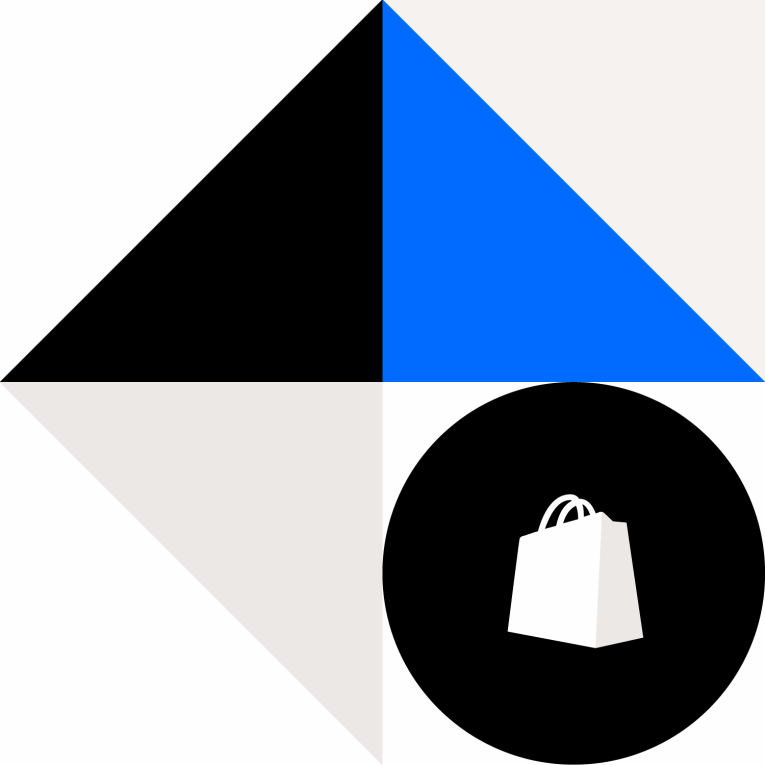What makes Shopify a great fit for your retail storefront?
Easy-to-Configure Features
Many features in Shopify can be configured by a non-technical user. This helps minimize development time and complexity, and it also makes it easier and cheaper to set up an ecommerce website.
Cart and Checkout
Shopify has a built-in shopping cart and checkout process that are configurable with minimal development. The developer only needs to update colors and fonts to match the rest of the website, and many web-savvy shop owners could handle this customization on their own.
Payment Gateways
Shopify can be integrated with several payment-gateway options, including Stripe and Authorize.net. However, in most cases, it makes the most sense to use Shopify’s built-in payment gateway. Set up is relatively easy for users. All you need to do is add your bank account and routing number to your Shopify account to start accepting payments.
Configuring PayPal, Apple Pay, and Amazon Pay for Shopify is also quick and easy. Like many features on the Shopify platform, this is configurable in the administrator dashboard.
Shipping Management
Users are able to connect their Shopify sites to their accounts for several shipping services, including UPS, FedEx, and USPS. Shopify makes it easy to print out postage, track order statuses, and manage free shipping offers.
Transactional Notifications
Shopify has several configurable features for transaction notifications. For starters, it has built-in order confirmations and shipping emails. However, we typically recommend clients customize these emails. Customizing your notification emails gives you another point-of-contact with users and provides an additional space for flexing your brand. Shopify also makes it easy for customers to opt-in to receive SMS messages when their order statuses have changes (e.g. “Your Order has Shipped”).
When You May Want a More Complex Platform
Shopify is one of the most versatile, full-featured, and constantly evolving platforms on the market today. But like any platform or app, it’s not necessarily the right product for every type of online store.
Inability to Customize
Shopify’s simplicity can be a major advantage, but it can create major restraints. As a Shopify Partner, we’ve come across a number of technical limits and constraints that have resulted in us using other ecommerce platforms. We once had a client who wanted a sleek product configurator that allowed customers to select custom colors, accessories, and other features. In this case, we had to go with another CMS/ecommerce platform due to Shopify’s limited customization capabilities.
No Customized Checkout
With Shopify, you cannot customize the checkout process to include special options or features. For example, if a store’s customers need the ability to pay with a purchase order, Shopify is not a viable platform. Shopify also makes it difficult to add custom features such as in-cart shipping calculators.
No Multi-Tenant Store
Shopify does not support multi-tent stores, meaning you can’t have multiple websites that share products or fulfillment functionality. This is likely not a deciding factor for companies new to ecommerce, but this may be something to consider for existing stores.
Rigid Tiered Pricing
Although it’s technically possible to offer tiered pricing with the use of variants, it’s often difficult to create the best user experience this way. For instance, if you want to offer a price break when a customer orders 10 or 30 of a product, you need to set up preset amounts the customer can order (1, 10, 30). So what if a customer wants to order 15, 20, or 25? This lack of dynamic tiered pricing can be a drawback of Shopify.
Customized Product Templates
If you are looking to add custom content to a product template, there are instances when this requires a third-party app. For example, if you want to add a tabbed section with product information, specifications, and reviews for each product, you will need to use a third-party app to upload, manage, and sync this data. This makes it more difficult to edit product content because some information lives in the product record and other information is kept in the third-party app.
Third-Party Apps
Shopify has many third-party apps, which at times can be very helpful and minimize the need for building pricy custom modules. But the integration of any third-party app can potentially create complications down the road. Not all apps have active support and, with time, may become outdated. There are also some common ecommerce features that Shopify relies on the app to manage, including filtered search and product reviews.
So, is Shopify the right ecommerce platform for you?
Shopify is a great platform for quickly building an ecommerce store front so you can focus on other aspects of your business. It comes packed with out-of-box features and tools that can give your online store a polished and professional feel. But Shopify, like any service, has its drawbacks. The simplicity of the platform makes it difficult for advanced customization, which may require some stores to choose a more complex platform.
We have extensive experience in a variety of web and app platforms from Salesforce to Magento to Wordpress and beyond. While we can work in any environment, a good number of our global and national clients are leveraging the following premier platforms for their stability, security, and flexibility across digital channels.
